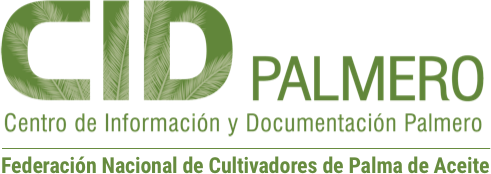| dc.creator | Mesa D., Jens | |
| dc.date | 1999-01-01 | |
| dc.date.accessioned | 2020-07-25T11:17:36Z | |
| dc.date.available | 2020-07-25T11:17:36Z | |
| dc.identifier | https://publicaciones.fedepalma.org/index.php/palmas/article/view/701 | |
| dc.identifier.uri | http://repositorio.fedepalma.org/handle/123456789/139329 | |
| dc.description | With an analysis of the palm sector, facing the economic situation that the country is experiencing today, the executive president of Fedepalma, Jens Mesa Dishington, opened the XXVII National Oil Palm Growers Convention which was held in Santa Marta last June. Doctor Mesa explained how the country's social situation has influenced in the security problems that the palm growers are facing today and how the productive activity has been affected. Due to the economic crisis that the country is experiencing, the palm growers have undergone a decrease in the profits from exportations due to the fall in the exchange rate. Furthermore, international prices will not be favorable in the immediate future which will affect the sector's gross income. Nevertheless, despite the circumstances, doctor Mesa invited the sector's industrialists not to lose faith in Colombia and acknowledged the initiatives and efforts that the National Government is making in order to find mechanisms which will allow activating and attracting new investors. As far as the balance of the palm sector in 1998, even though production registered a negative trend as a consequence of adverse climatic conditions, the commercialization results increased by 21%. With regard to competitiveness, he pointed out that the continued effort of the products was outstanding, but he recalled the lag which the country has, compared with producing countries such as Malaysia; we are almost 10 years behind as far as progress. If the planting, the development of the crop and the commercialization are carried out applying adequate techniques and handling competitive prices with the foreign producers, there is no doubt that the palm sector can contribute to Colombia as much as coffee has contributed. If Colombia wants to grow in the cultivation of oil palm, it should promote the association of large palm companies with local and foreign investments, restore security for persons and investments in the country's different zones and generate a macroeconomic environment that will benefit the sector (low interest rates and adequate financing). | en-US |
| dc.description | Con un análisis del sector palmero frente a la situación económica que vive actualmente el país, el presidente ejecutivo de Fedepalma, Jens Mesa Dishington, abrió el XXVII Congreso Nacional de Cultivadores de Palma de Aceite, que se realizó en Santa Marta el pasado mes de junio. El Dr. Mesa expuso cómo la situación social del país ha influido en los problemas de seguridad que enfrentan hoy los palmeros y como se ha visto afectada la actividad productiva. Debido a la crisis económica, por la que atraviesa el país, los palmeros han sentido una disminución en el ingreso de las exportaciones debido a la baja en la tasa de cambio. Además, los precios internacionales no serán favorables en el futuro inmediato lo cual afectará los ingresos brutos del sector. Sin embargo y pese a las circunstancias, el Dr. Mesa invitó a los industriales del sector a no perder la fe en Colombia y reconoció las iniciativas y los esfuerzos del Gobierno Nacional por buscar mecanismos que permitan dinamizar y atraer nuevos inversionistas. En cuanto al balance del sector palmero en 1998, aunque la producción registró un comportamiento negativo como consecuencia de condiciones climáticas adversas, los resultados en comercialización se incrementaron en un 21%. En lo relacionado con la competitividad, destacó el esfuerzo continuo de los productos pero recordó el atraso que se tiene frente a países productores como Malasia, del cual nos separan casi 10 años de adelantos. Si la siembra, el desarrollo del cultivo y la comercialización se realizan aplicando las técnicas adecuadas y manejando precios competitivos con los productores extranjeros, es indudable que el sector palmero puede llegar a aportarle a Colombia tanto como la ha hecho el café. Si Colombia quiere crecer en el cultivo de palma de aceite debe promover la vinculación de grandes empresas palmeras con inversión local y extranjera, restaurar la seguridad a las personas y a las inversiones en las diferentes zonas del país y generar en entorno macroeconómico que beneficie al sector (bajas de interés y financiamiento adecuado) | es-ES |
| dc.format | application/pdf | |
| dc.language | spa | |
| dc.publisher | Fedepalma | es-ES |
| dc.relation | https://publicaciones.fedepalma.org/index.php/palmas/article/view/701/701 | |
| dc.rights | Derechos de autor 2017 Revista Palmas | es-ES |
| dc.rights | https://creativecommons.org/licenses/by-nc-nd/4.0 | es-ES |
| dc.source | Revista Palmas; Vol. 20 Núm. 2 (1999); 72-80 | es-ES |
| dc.source | 0121-2923 | |
| dc.subject | palma de aceite | es-ES |
| dc.subject | elaeis guineensis | es-ES |
| dc.subject | industria de la palma | es-ES |
| dc.subject | incentivos | es-ES |
| dc.subject | productividad | es-ES |
| dc.subject | costos de producción | es-ES |
| dc.subject | competitividad | es-ES |
| dc.subject | políticas | es-ES |
| dc.subject | mercadeo | es-ES |
| dc.subject | exportaciones | es-ES |
| dc.subject | comercialización | es-ES |
| dc.subject | sector palmicultor | es-ES |
| dc.title | Oil palm's priority : to grow again | en-US |
| dc.title | La prioridad de la palma de aceite : volver a crecer | es-ES |
| dc.type | info:eu-repo/semantics/article | |
| dc.type | info:eu-repo/semantics/publishedVersion | |


